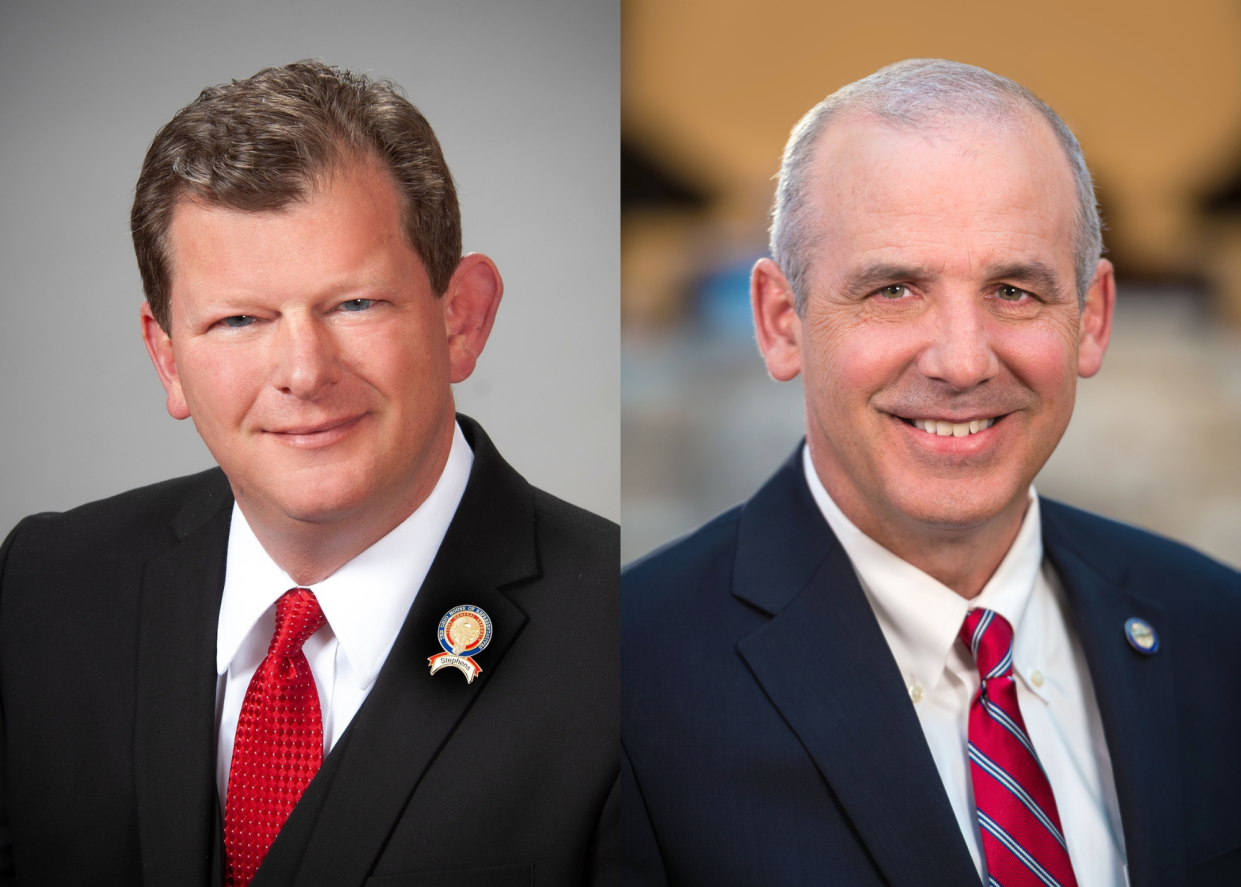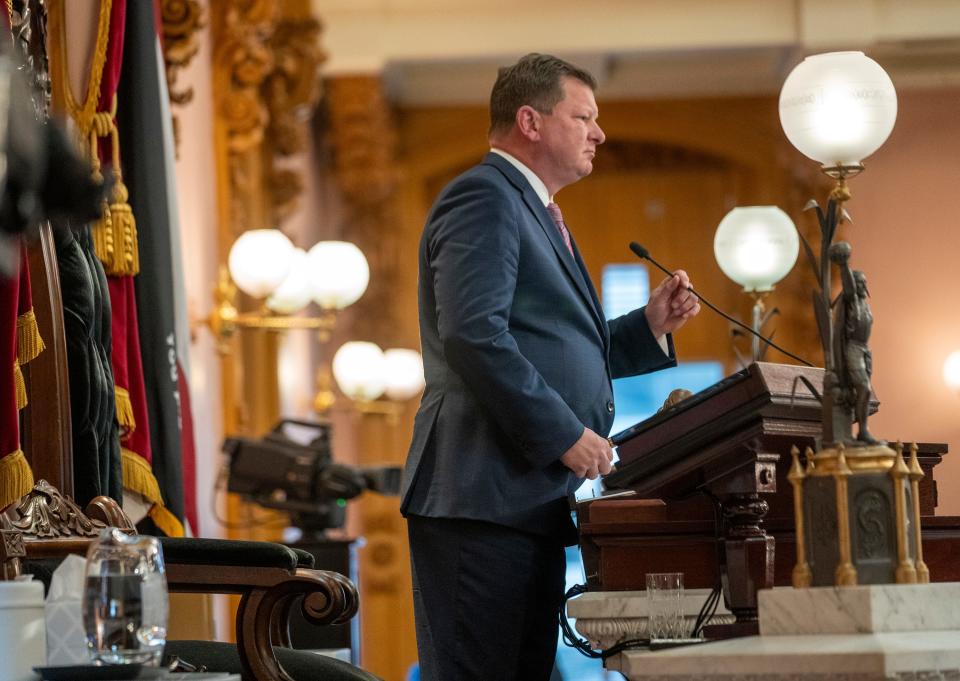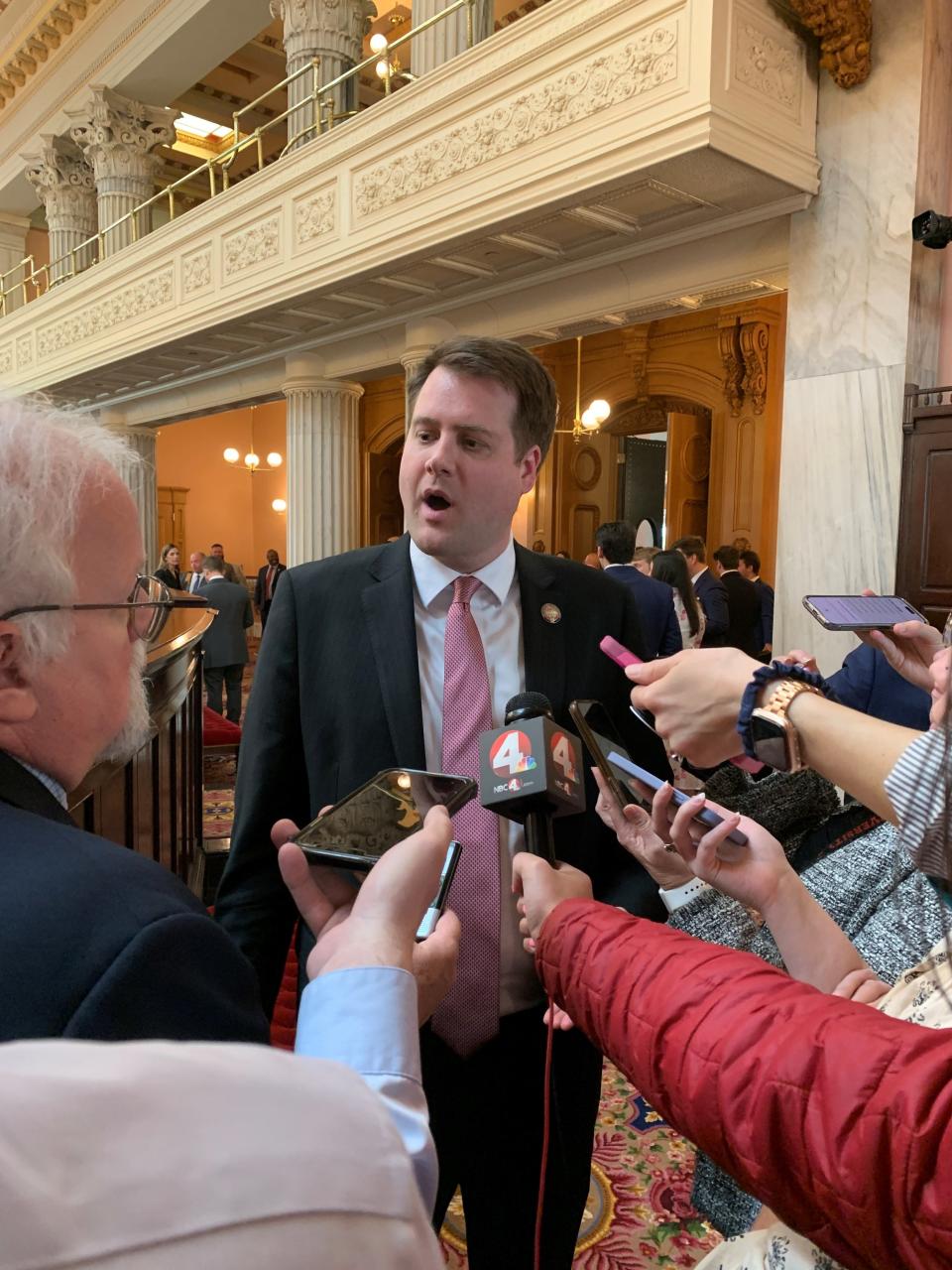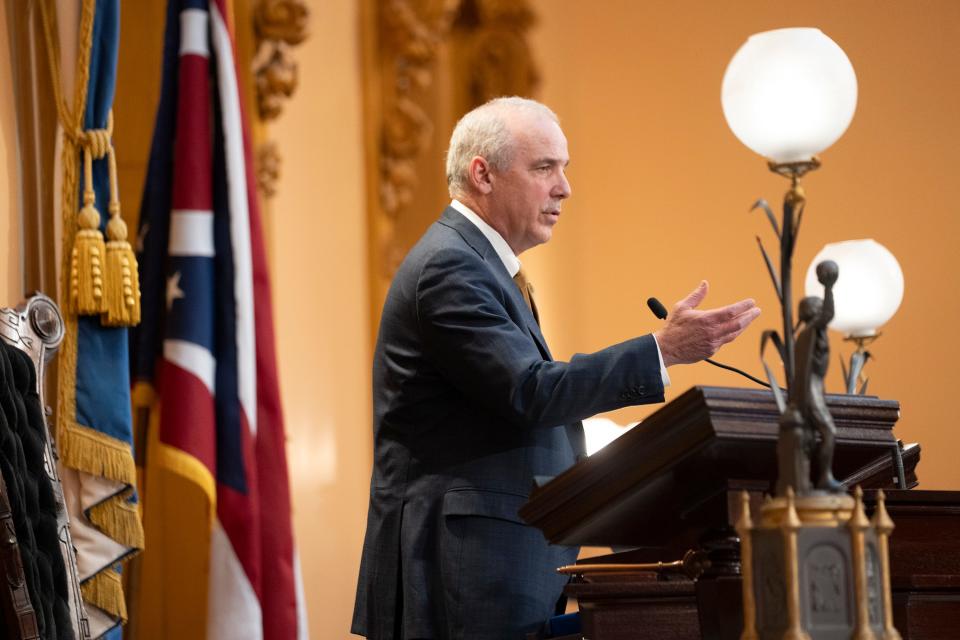Ohio primary 2024: House Republicans fight internal battles at ballot box

- Oops!Something went wrong.Please try again later.
- Oops!Something went wrong.Please try again later.
- Oops!Something went wrong.Please try again later.
While Americans watched a contentious battle for speaker of the U.S. House of Representatives, a similar internal war was playing out in Columbus. Ohio House Republicans fight over which bills to pass and who should be in charge. They argue over how campaign money is spent and who is a real Republican.
The rampant infighting has boiled over into a vicious campaign cycle, pitting Republicans against one another for control of the Ohio House after 2024. Attack ads for the March 19 primary accuse GOP candidates of aligning with President Joe Biden or − perhaps more perilously in a Republican primary − opposing former President Donald Trump.
The wounds of a 2023 leadership fight in the Ohio House have never healed, but Republicans are already waging a battle over who will serve as speaker in 2025. A certain amount of infighting is to be expected during a primary pitting fellow Republicans against one another, but this election season has been particularly acrimonious.
Democrats, who have no reasonable expectation of winning control of the chamber in November, are watching from the sidelines for now. They have played a significant role in choosing two recent speakers.
"These are nasty primaries," said Jordan Hawkins, executive director of House Democrats' campaign arm. "You go from having two speakers who were investigated by the FBI. You've got members of your caucus that are waging civil wars against one another. You've got members of your caucus who have to resign ... because of issues of domestic violence. We have our issues, but we don't have those kinds of issues."

How did House Republicans get here?
The Ohio House of Representatives hasn't had a smooth leadership transition in years. In the last decade, the chamber has had six different speakers − double the number of Senate presidents in that same time. Two of those House leaders faced FBI investigations. Two served for less than seven months.
The most recent speaker battle pitted Jason Stephens, a Republican from Kitts Hill near Ohio's southern tip, against Toledo-area Rep. Derek Merrin. Republicans picked Merrin during an internal vote, but Stephens worked with Democrats to win the job in January 2023. Stephens became speaker with votes from 22 Republicans and 32 Democrats. Merrin, who is unable to run in 2024 because of term limits, launched a congressional bid to unseat Rep. Marcy Kaptur in the northwest Ohio district.

The move was similar to one executed by former House Speaker Larry Householder, who won the gavel with the backing of 26 Republicans and 26 Democrats in 2019. But Householder won over GOP opponents by playing political chess and wielding a massive war chest. The FBI would later reveal that war chest was fueled by an illegal pay-to-play scheme that would land Householder in prison for 20 years.
Unlike in Householder's coup, Stephens' GOP opponents remained angry. They labeled the new speaker's backers the "Blue 22" for siding with Democrats and got those lawmakers censured by the Ohio Republican Party.
The speaker of the Ohio House of Representatives is an immensely powerful position − even if many Ohioans don't know his name. Stephens controls which bills are brought up for votes and which lawmakers get to lead committees, a role that comes with a bigger paycheck and some power.
Stay informed: Newsletter, podcast focus on 2024 election news
Stephens' opponents contend that the new speaker didn't move quickly enough on a plan to make it harder to amend the state constitution − an effort aimed at blocking Ohio's abortion rights amendment. The idea would ultimately pass the GOP-controlled Legislature only to be rejected by Ohio voters in a costly August election last year.
Stephens also hasn't called a vote on a controversial Senate bill that would eliminate mandatory diversity, equity and inclusion programs at Ohio's universities and colleges. Republicans backing the bill say they have enough support to pass it. They tried to force a vote on the floor during the House's last meeting before the March primary.
Stephens called that effort "showmanship" and "silly." He told reporters earlier this month: "It's been blatantly obvious that some members of our caucus are working actively against Republican members of this caucus."
The next speaker fight
House Republicans aren't just fighting over the last speaker battle. They are already waging the next one.

Longtime Lima legislator Matt Huffman, who is currently leading the Ohio Senate, wants the speaker's gavel next year.
Huffman, who served in the House from 2007 to 2014, is backing several Republicans running for the House in open seats. They include businessman Mark Hiner who is running against Householder ally Scott Pullins and IT professional Brandon Lape for a seat that includes Knox, Coshocton and Holmes counties. Huffman's campaign gave $10,000 to Jack Daniels, a New Franklin councilman whom the Summit County GOP picked to replace former Rep. Bob Young after the lawmaker was convicted of domestic violence. Stephens hasn't filled that seat, instead waiting for the results of the March primary.
Huffman's campaign has also donated to several incumbent House candidates, who either backed Merrin like Reps. Bill Roemer, Josh Williams and Andrea White or who weren't present for the last speaker fight, such as Rep. Brian Lorenz. Huffman gave $10,000 to Sen. Stephanie Kunze, a longtime Republican lawmaker running for a Democratic-leaning House seat in northwest Franklin County.
The looming speaker fight has complicated negotiations in a Legislature where, at least in theory, Republicans have the power to easily pass bills that suit their politics. The GOP holds a veto-proof majority in both chambers, which means they don't need Democrats − or even Republican Gov. Mike DeWine − to enact legislation.
Despite this power, last year was the least productive lawmaking year in Ohio since at least 1955 with only 16 bills signed into law, Cleveland.com reported.
Republicans can't agree on what to do − or not do − with legal marijuana, which both rural and urban voters approved easily in November. They aren't on the same page when it comes to a $700 million spending bill. They even squabbled over who should chair a redistricting committee drawing new legislative districts.
Negotiations between the House and Senate always involve some political gamesmanship, but the fights over the speakership have taken it to a new level.
Masks, betrayal and more
As Ohio approaches the March 19 primary, these heated GOP House races are boiling over.
Southern Ohio candidate Gina Collinsworth has asked her opponent, Rep. Justin Pizzulli, to have an ad taken down that features Collinsworth in a mask. She said in a social media post that the photo is from 2021 when her husband was receiving chemotherapy treatment in a hospital that required masks. "I didn't want to wear a mask, but I did it so I could see my husband in the hospital."
In Butler County, Rep. Sara Carruthers faces a challenger, Hamilton pastor Diane Mullins, who preached separation of church and state was a lie and that an American communist cell sought to replace all good sculptures with "shapeless, awkward and meaningless forms." Carruthers, who voted for Stephens as speaker, has been labeled one of the "Blue 22" and was sanctioned by the Ohio Republican Party.
"I get the Blue 22 thing, and I'm so tired of it," Carruthers said. "Quite frankly, if you had the choice as a Democrat, or a Republican, of choosing a speaker who was going to treat you like a human being or choosing a speaker that was never going to do anything for you or give you a breath, who would you choose?"
Ohio Conservatives PAC has disparaged Rep. Haraz Ghanbari, who backed Stephens, for "crimes against conservatives." Ghanbari's middle name is "Nahshon" but the group repeatedly uses "Hussein" instead. Ghanbari faces challenger Sally Culling, whom the House GOP campaign arm has slammed over her British roots.
Several GOP candidates challenging Stephens' supporters are getting help from Americans for Prosperity, a conservative super PAC affiliated with the Koch brothers. AFP has gotten more involved in GOP primaries across the country in recent years.
“A number of organizations don’t have an appetite for the primaries," said Donovan O'Neil, the Ohio state director for Americans for Prosperity. But in reliably Republican areas, primaries are the only truly contested race.
Young Americans for Liberty-funded Make Liberty Win sent out mailers that read: this candidate "betrayed you and your Republican principles!" An American Action Fund Facebook ad questioned why a state representative would oppose Second Amendment rights. AFP and the Koch brothers have donated to Young Americans for Liberty in the past.
If a Stephens backer loses in the primary, that helps Huffman's speaker bid. But O'Neil says his organization isn't motivated by a leadership vote. “It’s not because of their support for Speaker Stephens," he said. "It’s because of their policy positions.”
AFP endorsed Republican presidential candidate Nikki Haley over Trump − a fact that Stephens' campaign arm has jumped on. The Ohio House Republican Alliance, the campaign team for House Republicans, has launched ads that accuse GOP challengers of accepting help from anti-Trump "swamp friends." OHRA did not respond to requests for comment.
Looming legal battles
As the primary looms, a lawsuit threatens the financial future of OHRA. A judge ruled in 2022 that House Republicans were on the hook for $1.6 million from a lease signed by Householder's former political consultant. The landlord still wants its money, and it's not clear if the current House GOP campaign arm will have to pay Householder's bill.
At the same time, Republicans are still fighting over who controls the campaign coffers. Several Republican Stephens opponents filed a lawsuit, saying Stephens shouldn't control House Republicans' campaign money and was using it to benefit only his backers.
However, a Franklin County judge wouldn't freeze the funds. Franklin County Common Pleas Court Judge Mark Serrott wrote recently: “It is impossible to ignore the specter of political gamesmanship that looms over this litigation."
Jessie Balmert is a reporter for the USA TODAY Network Ohio Bureau, which serves the Columbus Dispatch, Cincinnati Enquirer, Akron Beacon Journal and 18 other affiliated news organizations across Ohio.
This article originally appeared on Cincinnati Enquirer: Election 2024: House Republicans fight internal battles at ballot box

